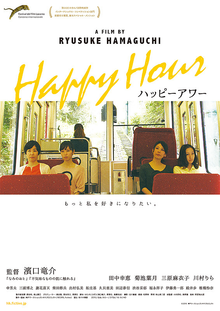
This one has been sitting in my list for a while now but it was quite difficult to find a copy of it. With a running time of more than five hours, it’s also easily the longest film we’ve ever watched. It’s not an experimental film either so its long running time isn’t a gimmick. It’s legitimately a drama about four middle-aged women and justifies every minute of its time. However we did need to watch it over several days.
Akari, Sakurako, Fumi and Jun are four friends who enjoy spending time and going on outings together. After participating in a workshop that focuses on unconventional ways of communicating with one another, it emerges that Jun is in the middle of a messy divorce that her husband is contesting in court. Sakurako is reminded that her own husband has been neglecting her and she fiercely defends Jun’s right to break away. When the friends visits the nearby hill resort, Fumi’s husband is there as well but rather than staying with them he is accompanying a young female writer as he is her editor and she is writing a story on the place. Fumi’s friends at first tease her about being jealous and she is reticent about it but it soon becomes clear that she does indeed resent it. Meanwhile Akari is single and she considers becoming involved with a single father mainly to have a relationship with his daughter.
With a film of this length, naturally there’s a whole lot more than that going on than can be summarized in a single paragraph. It’s no wonder that it’s so long however as director Ryūsuke Hamaguchi likes to include full scenes in their entirety. For example the workshop they attend begins with the artist Ukai demonstrating his ability to balance objects perfectly and extends to people finding their own personal center of gravity and then communicating that to other people using their bodies. The director not only included the entire workshop but also the whole discussion that the participants have afterwards over a meal together. Similarly another event has the writer Nose read a short story at the same location and pretty much the whole reading is put on film. It’s extraordinarily extensive, yet the conversations are so dense and interesting that the film is never boring. Indeed, the reading that Nose delivers makes for a vivid experience, especially when Fumi reacts to it as she realizes that the writer is talking about her feelings for her own husband.
The overriding theme here is the expected one of communication or more specifically how married couples can live together for years and yet not know what is in each other’s hearts. My wife complains that all of the characters seem to speak with the same voice and that their situations are too similar. However I like that there are ever so subtle differences. Sakurako’s husband appears to think he and his wife both have separate responsibilities in the household and sees no need for each of them to be concerned with the other’s domain. Fumi’s husband does talk to her on a daily basis but with such politeness that they feel more like professional colleagues than a married couple. It’s gratifying to see how that extends to the friends as well. Sakurako and Jun have known each other the longest ever since they were children in school, but it is only when Sakurako attends a hearing of Jun’s divorce case in court that she hears the latter’s true feelings about the state of her marriage. As Sakurako notes, it is as if she is getting to know Jun for the first time.
Another aspect that I like is that the film is also saying something about how Japanese social traditions impede effective communication. It is notable that strangers are more often able to freely share their thoughts and feelings than family members. Even so whenever the conversations wander into more abstract statements such as some of the mysticism around Ukai, it straddles the boundary between profound insight and empty obfuscation. It’s very frustrating that the film makes out Ukai to be such a mysterious figure and never explains his thoughts and motivations.
Happy Hour doesn’t quite reach the heights of true greatness. There are flaws in the acting and I think it could stand to be a little more unique in its themes and visuals. It does come close however which is all the more impressive once you realize that most of the performers aren’t professionals and this project was born in an acting workshop. This means long as this film is, it’s worth watching every minute of it.